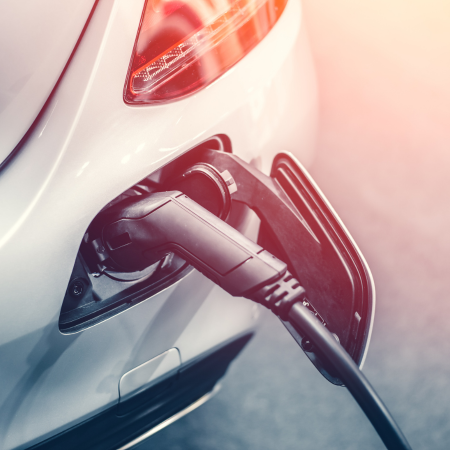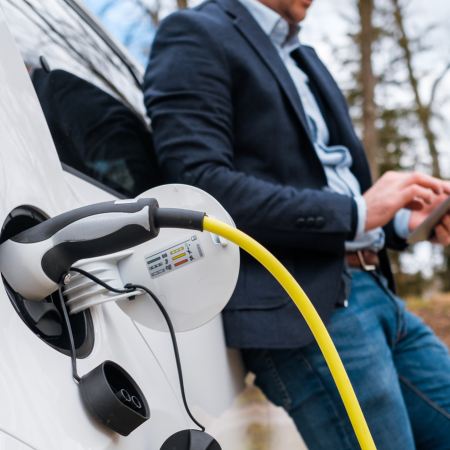With Electric Road Cars becoming rapidly popular in the UK, the demand for home EV chargers is becoming a home necessity with more and more homeowners transitioning towards electric vehicles.
If you are contemplating buying an electric vehicle, you will also need to figure out which EV Charger you will require. This can be a daunting task as there are many more EV Chargers available today on the market.
Our energy professionals at City Plumbing have compiled an essential guide to answer all your burning questions and provide you with the confidence you need to choose a suitable EV charger.
How an EV Charger Works?
An EV Charger works by converting alternating current (AC) electricity from the grid to direct current (DC). The electricity is altered when the cable from the charging station is plugged into the port of your electric car and continues until the battery is fully charged. This makes it a convenient method and a cost-effective way to power your vehicle.
Which EV Charger Should I buy?
When it comes to EV Chargers, there are three main types available on the market to choose from: Level 1 Chargers, Level 2 Chargers and DC Fast Chargers.
Level 1 Chargers - These are considered the slowest charger available. They use a standard 120-volt household outlet that can add approximately 5 miles of range per hour of charging.
Level 2 Chargers - These are faster than Level 1 Chargers that use a 240-volt outlet. Level 2 chargers can add approximately 25 miles of range per hour of charging.
DC Fast Chargers - These are the fastest EV Chargers available that can add around 80 miles of range in approximately 15 minutes of charging. DC Chargers are typically found at public charging stations but are becoming a popular choice among installers for home installations.
While there are 3 types available, a 7.4kW charger generally be recommended for an average home & EV in the UK - however if you are looking to save some money, a 3.6kW charger would suffice if you don’t mind slower charging speeds.
Chargers come with various features such as built-in Wi-Fi, Bluetooth compatibility and voice control. For example, the Wallbox Pulsar range features a compact, robust design that provides a powerful, fast charge. It also comes with a range of helpful smart features to make EV charging even easier.
What Plug Connection will I need?
There are two different connectors available for charging an electric car at home.
Type 1 connectors - are older, and differently shaped to the standard type 2 socket. They are rare these days, with most new EVs using type 2 connectors. However, they are still available for those with pre-2014 electric vehicles.
Type 2 connectors - are the most commonly used socket for electric cars. This is because EU regulations state that all plug-in vehicles manufactured after 2014 must have a Type 2 socket.
Can I speed up the charging time?
It is possible to speed up the charging time of your electric vehicle; however, you will need a three-phase connection to do so, which many homes in the UK are unlikely to have.
You can check to see the phase network of your home by checking the fuse box. If you have one 100 amp fuse, it means you have a single-phase connection. If the fuse box has three fuses, your home is on a three-phase connection.
Three-phase connections are becoming widespread across the UK, so if you want a higher power rate by upgrading to a three-phase connection, you should speak with your energy supplier.
Are EV Chargers free to use?
There are several free-to-use charging stations which are typically found in government buildings, parking bays and other public spaces; however, the majority of public EV chargers are free to use.
Most EV charging points will incur a cost per minute or per kilowatt-hour of charging. The price for charging can also vary depending on the area, type of charger, and the time of day.
This is why an increasing number of EV drivers are turning towards installing their own EV charger at home.

How much does home EV charging cost?
When buying an electric car, it’s important to consider the costs associated with charging it at home.
At the time of writing, fully charging a standard 60kWh battery with a ~200 mile range from empty to full costs around £17 on average.
Keep in mind that electric vehicles rarely need charging from empty to full, and most home charges will be top-up charges.

When should I charge my Electric Car?
The perfect time to charge your electric car will all lean on your particular needs and circumstances. There are, however, a few tips that can help you make the most of your car's battery and charging time. By following these essential tips, you can help prolong the life of your EV's battery and make the most of your charging time.
Charge your car when it's convenient.
There is no rush to charge your car as soon as you get home. In fact, it is recommended to charge your car overnight when electricity rates are typically lower.
Don't let your battery run down too low.
It's optimal to keep your car battery between 20% and 80% charged for optimal performance and longevity, as you can put too much strain on the battery the longer you wait to charge your car.
Use a Level 2 charger if possible.
Use a level 2 charger as they are much faster, so you can save time by charging your car quickly. Level 2 EV Chargers can be found in public places, parking garages and shopping areas.
Take advantage of free charging.
Take advantage of free charging whenever possible, as many free public charging stations are available. Free charging points can be found on the government website in your area.
Can an EV charger identify the car when not charging?
Plug & Charge means the EV charger can automatically recognize and identify when your electric car is not charging without requiring an RFID card or app, making charging more suitable and seamless for EV drivers.
Plug & Charge is a relatively new technology, though it is becoming more widely adopted and a new transnational standard for EV Chargers.
Can EV Chargers get installed outside?
EV chargers can be installed outside, as there are several EV Chargers on the market that are specifically designed for outdoor use. If you are considering installing an EV Charger outside, it is essential to follow these safety steps to install an EV charger outdoors safely and efficiently.
- Ensure your EV Charger is waterproof.
- Choose a location for the charger that is protected from the elements.
- Make sure that the EV Charger is appropriately grounded.
- Installation near your electric panel will make the installation process more manageable.
- To help protect the charger from overheating, ensure the area is well-ventilated.
- Ensure that the charger is installed correctly by a qualified electrician.
How much is an EV Charger to install at home?
The cost of fitting an EV charger at your property can depend on a few key factors, including the type of charger you select, the location of the charger, and the local labour rate.
It is important to remember that while advanced EV Chargers can cost upwards of £1,000, there are many government incentives available to make home installation more affordable to homeowners.
Can I install an EV Charger myself?
EV chargers should always be installed by a qualified electrician, so unless you hold the correct qualifications to install EV chargers, this work should always be carried out by a certified professional.
We discussed EV charger installation in depth in a previous article for electricians and tradespeople, including the qualifications needed for installation. We cover the basic assessments required and go into more detail on how an EV Chargers should work effectively and efficiently.
Will EV Chargers Get Cheaper?
EV chargers are expected to decline in the coming years, as several factors are being taken into consideration that is reducing the overall price and making them more affordable such as;
Increased competition
Now more than ever, there has been a massive influx of companies that currently manufacture EV chargers, driving down prices on the market.
Improved technology
New technologies are making EV chargers more efficient and less expensive to manufacture.
Government grants
Local governments around the UK are offering incentives to facilitate homeowners with the adoption of EVs, which overall is helping to neutralise the cost of EV chargers.
Besides the factors discussed above, a few other factors may contribute to the cost decline of EV chargers. Economies of scale could reduce EV costs as demand increases.
Research and development on EV charging technology may also lead to the development of less expensive, more efficient chargers.

At City Plumbing, we stock a vast range of EV chargers in-stock and ready for your next EV charger installation project.
City Plumbing is an installer’s secret weapon for navigating the latest and greatest in renewable technology installation. For expert advice, get in touch with our dedicated energy-efficiency experts, or contact your local City Plumbing branch.



